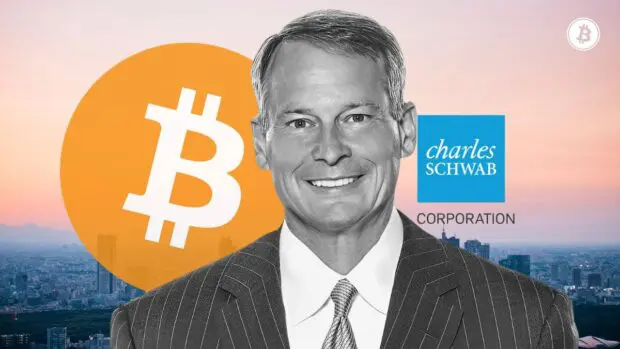Charles Schwab Corporation, a financial giant with assets totaling $8.5 trillion, has adopted a seemingly cautious approach towards digital assets, prompting analysts to speculate on potential missed opportunities in a rapidly evolving market.
The company’s decision not to launch its own proprietary spot Bitcoin Exchange-Traded Funds (ETFs) despite the recent Bitcoin ETF approval by the Securities and Exchange Commission (SEC), has raised eyebrows in the financial community.
Here’s What Analysts Suggest
Schwab, known for its methodical product development strategy, swiftly made all 11 spot bitcoin-based ETFs available on its platforms, Schwab.com and Thinkorswim, following the SEC’s approval of spot Bitcoin ETFs two weeks ago. This move marked a departure from its previous offering of only a Grayscale closed-end fund.
However, the absence of a proprietary spot Bitcoin product has led some analysts to suggest that the asset manager might be strategically considering second-mover advantages.
According to a recent report, Ric Edelman, founder of the Digital Assets Council of Financial Professionals, believes that by refraining from launching its own ETF, Charles Schwab is avoiding potential conflicts of interest and the need to actively endorse or promote specific funds.
Ari Sonneberg, a partner at Wagner Law Group, notes that Schwab appears content with profiting from existing ETFs and has chosen not to create its own at this moment. He states:
“What Schwab also knows is that they are leaving money on the table, at least at the moment, by not having their own. Schwab seems to be satisfied making money off other ETFs.”
Notably, CEO Walter Bettinger did not address the matter in the company’s recent business update on January 17.
Schwab’s crypto-thematic ETF (STCE), launched in 2022, has garnered only around $21 million in assets, indicating a moderate reception. Additionally, the company has taken a stake in EDX, a third-party digital asset exchange, along with Fidelity. According to Sonneberg, Charles Schwab remains at least a year behind its rivals in launching a Bitcoin ETF. He states:
“It looks like other bitcoin ETFs, like BlackRock’s, took a bit over a year to launch. I would expect that to be about the same for Schwab, although they might benefit in that respect by having had others pave the way.”
Bitcoin ETF Approval: Schwab Might Surprise the Market
While competitors like Fidelity Investments and BlackRock have swiftly entered the market with low-fee spot Bitcoin ETFs, Charles Schwab seems to be observing from the sidelines. Eric Balchunas, a senior ETF analyst with Bloomberg Intelligence, took the matter on X to suggest that Schwab might surprise the market by introducing a competitively priced Bitcoin ETF in the near future.
He states:
“Don’t sleep on Schwab, they’re never first to market in anything but they make back impact when they come in w/ dirt cheap fee + 30M active brokerage accts. And they do NOT like Fidelity, so FBTC’s success could annoy them to file something sooner rather than later.”
Despite the delay, Morningstar analyst Bryan Armour believes that Charles Schwab’s deliberate and cautious approach aligns with its historical product development strategy. He states:
“They’re more methodical with their approach to product development than others. They trade the first-mover advantage for having a more thoughtful lineup that can stick with them for the long term.”
A Calculated Move
The decision not to rush into the Bitcoin market may be a calculated move by Charles Schwab, especially considering the recent BTC price volatility. The caution is evident in the company’s website, where it quotes SEC Chair Gary Gensler, stating:
“While we approved the listing and trading of certain spot bitcoin (ETFs) today, we did not approve or endorse bitcoin. Investors should remain cautious about the myriad risks associated with bitcoin and products whose value is tied to crypto.”
Schwab’s cautious stance contrasts with its previous pronouncements in 2019, when it labeled digital assets as purely speculative instruments. In April 2021, CEO Walter Bettinger expressed his readiness to enter the bitcoin market pending regulatory clarity.
The company’s conservative role, as described by Bitcoin advocate Mike Alfred, reflects a deliberate and careful strategy. He states:
“As a long-time Schwab customer, I am pleased that Schwab has not prevented customers from accessing commonly available crypto products like GBTC. While they can certainly do more in the future, their strategy to date has been to tread very carefully and cautiously.”
While Schwab may be perceived as a late entrant into the bitcoin ETF space, its established reputation, scale, and potential for competitive fee offerings could position it favorably in the long run.
Only time will tell whether Schwab’s strategic wait-and-see approach proves to be a prudent move or a missed opportunity in the dynamic world of digital assets.










